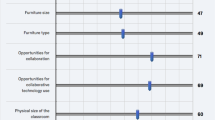Conclusions
The Computers in the Curriculum Project has developed a clear philosophy and model for operation by involving teachers, programmers and curriculum specialists in the investigation and development of CAL materials. It has been a valuable exercise to test and extend this work into a new discipline area. Many related issues, however, need to be addressed:
-
how is CAL currently perceived and used in the classroom?
-
what sort of classroom organization fosters good CAL?
-
what pressures are created by CAL on an already crowded discipline syllabus?
-
how successful is CAL at fostering particular styles of learning?
All enquiries must extend beyond evaluating classroom use of materials. The Project also wishes to address itself to the growing relationship between CAL and the moving curriculum. As the potential of CAL and Information Technology is increasingly understood, will the curriculum move in directions not hitherto envisaged or possible? The relationship between education and the new technology it seeks to embrace will be a fruitful area of exploration throughout the 1980s.
Similar content being viewed by others
References
R. Fothergill, “The Microelectronics Education Programme— the Strategy.” Department of Education & Science, London, 1981.
Department of Industry. “Micros for Schools” scheme. Department of Industry Schools Liaison Service. London, 1981.
Deryn M. Watson, “Humanities Teachers Write Imaginative CAL.”Proceedings of 6th International Conference on Computers and Humanities. ed. S.K. Burton, and D.D. Short, Rockville, MD: Computer Science Press, 1983.
R. Lewis, & D. Want, “Educational Computing at Chelsea 1969–79” inComputer Assisted Learning: Scope, Progress and Limits, ed. R. Lewis and E.D. Tagg, Amsterdam: North Holland, 1969.
Deryn M. Watson, “Some Implications of Micros of Curriculum Development,”Involving Micros in Education, ed. R. Lewis and E.D. Tagg, Amsterdam: North Holland, 1982.
Deryn M. Watson, “A Model for the Production of CAL Material,”Computers and Education, 7:3 (1983), 167–176.
Deryn M. Watson, “Enabling School Pupils to Interrogate Census Data,”Historical Social Research, No. 29 (1984), pp. 66–75.
Deryn M. Watson, “The Role of CAL in Decision Making,”Computers and Education, 8:1 (1984), 31–34.
CAMPAIGN—Edward I's Campaign to Crécy (Computers in the Curriculum), Longmans Microsoftware, Harlow, 1983.
CHOICE—Disraeli and the Eastern Question (Computers in the Curriculum), Longmans Microsoftware, Harlow, 1983.
Dennis Schemilt, The History 13–16 Project (The Director, Trinity & All Saints College, Horseforth, Leeds, U.K.).
ARCHEO—Shallow Hill (Computers in the Curriculum Project Unit under development).
CALLBOARD, Vols. 1, 2, 3, & 4. Contact Graham Davies, editor, Ealing Technical College, London W5, U.K.
CILT Report on autumn 1983 Conference “Assessing Current Programs and Prospects,” Contact Eric Brown, CILT, Carlton House Terrace, London SW1, U.K.
MILL—Windmill Location Game (Computers in the Curriculum), Longmans Microsoftware, Harlow, 1981.
COPROB (Computers in the Curriculum under development).
D. Barnes, J. Britton, H. Rosen, and LATE,Language, the Learner and the School London: Penguin, 1969.
D. Chandler, ed.Exploring English with Microcomputers. London: Council for Educational Technology, 1983.
STORYBOARD (contact John Higgins, British Council, London).
BRANCHING STORY (Computers in the Curriculum under development).
STORYMAKER—an adventure generator (Computers in the Curriculum under development).
Author information
Authors and Affiliations
Rights and permissions
About this article
Cite this article
Watson, D.M. Computer-assisted learning for school pupils of history, French and english in the UK. Comput Hum 18, 233–241 (1984). https://doi.org/10.1007/BF02267227
Issue Date:
DOI: https://doi.org/10.1007/BF02267227



